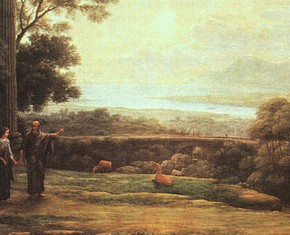The views expressed in our content reflect individual perspectives and do not represent the authoritative views of the Baha'i Faith.
When a new prophet appears, Baha’u’llah writes in The Book of Certitude, the established clergy always oppose and persecute him.
Historically, Baha’u’llah singles out religious leaders for special blame. Theirs is the great responsibility of leading the faithful, yet they have always been in the vanguard of the enemies of every prophet:
Leaders of religion, in every age, have hindered their people from attaining the shores of eternal salvation, inasmuch as they held the reins of authority in their mighty grasp. Some for the lust of leadership, others through want of knowledge and understanding, have been the cause of the deprivation of the people. By their sanction and authority, every Prophet of God hath drunk from the chalice of sacrifice, and winged His flight unto the heights of glory. What unspeakable cruelties they that have occupied the seats of authority and learning have inflicted upon the true Monarchs of the world, those Gems of divine virtue! Content with a transitory dominion, they have deprived themselves of an everlasting sovereignty. Thus, their eyes beheld not the light of the countenance of the Well-Beloved, nor did their ears hearken unto the sweet melodies of the Bird of Desire. For this reason, in all sacred books mention hath been made of the divines of every age.— The Book of Certitude, p. 15.
The people assume their share of fault, too, because they do not think for themselves. Instead, they act based on the expectations set by their leaders:
Unto every discerning observer it is evident and manifest that had these people in the days of each of the Manifestations of the Sun of Truth sanctified their eyes, their ears, and their hearts from whatever they had seen, heard, and felt, they surely would not have been deprived of beholding the beauty of God, nor strayed far from the habitations of glory. But having weighed the testimony of God by the standard of their own knowledge, gleaned from the teachings of the leaders of their faith, and found it at variance with their limited understanding, they arose to perpetrate such unseemly acts.— The Book of Certitude, p. 15.
Baha’u’llah explains that God tests humanity by revealing His Word in terms that are not always literal. He offers abundant examples of this, citing passage after passage of the Bible and the Koran and demonstrating their true meaning. For example, he refers to a passage from the New Testament wherein Jesus Christ tells the signs of his second coming:
Immediately after the oppression of those days shall the sun be darkened, and the moon shall not give her light, and the stars shall fall from heaven, and the powers of the earth shall be shaken: and then shall appear the sign of the Son of man in heaven: and then shall all the tribes of the earth mourn, and they shall see the Son of man coming in the clouds of heaven with power and great glory. And he shall send his angels with a great sound of a trumpet.—Mathew 24:29–31.
Baha’u’llah explains that the terms “sun” and “moon,” when mentioned in the writings of the prophets of God, do not refer solely to the sun and moon of the visible universe. These terms symbolize manifold spiritual truths.
In one particular case, the word “sun” stands for the divines, the leaders of religion:
That the term “sun” hath been applied to the leaders of religion is due to their lofty position, their fame, and renown. Such are the universally recognized divines of every age, who speak with authority, and whose fame is securely established.— The Book of Certitude, p. 37.
Yet once the true sun is revealed in the form of a new prophet, these suns go dark in the relative brightness of the new light from God. The same is true for the “moon” and “stars.”
 Baha’u’llah also interpreted these terms as symbols of the laws and teachings of God. When God sends a new messenger, the “sun,” “moon,” and “stars” of the past are replaced with new teachings.
Baha’u’llah also interpreted these terms as symbols of the laws and teachings of God. When God sends a new messenger, the “sun,” “moon,” and “stars” of the past are replaced with new teachings.
Similarly, Baha’u’llah states that the term “return” does not signify the literal return of an individual messenger to earth, but the return of the same divine qualities, the same manifestation of the Holy Spirit. In that sense each new messenger is the “return” of those who preceded Him. When the scriptures speak of the end of the world, of the descent of Christ from heaven in the last days, of the Day of Judgment, and of the resurrection of the dead, these are also symbolic terms. The physical world will not really be destroyed, nor will the physical moon and sun go dark. The return of Christ descending from heaven is not a literal event—it means the reappearance in the world of the Christ Spirit, which comes from heaven. The Resurrection will not entail bodies of the dead coming back to life; it signifies the spiritual reawakening of those who believe and follow God’s messenger.
But why does God speak in such symbolic terms and not plainly? Profound spiritual truth cannot be stated in literal terms, superficially. Baha’u’llah explains that this is done to test humanity so that the sincere souls can be distinguished from those who cling blindly to tradition.
An examination of religious history validates Baha’u’llah’s assertions. For example, the main reason the Jews persecuted Christ was that he did not appear to have fulfilled the ancient prophecies concerning the Messiah. They expected a personage who would occupy the throne of David and thus rid them of their Gentile overlords, the Romans. Yet Christ’s sovereignty was not of that kind. His was a heavenly dominion, and the Kingdom of God of which he spoke was a spiritual reality.
















Comments
Sign in or create an account
Continue with Googleor